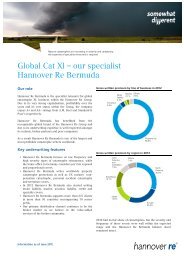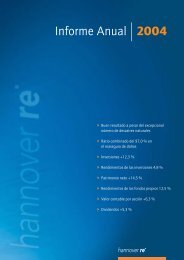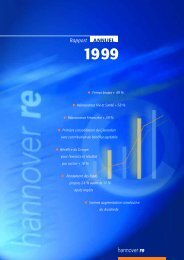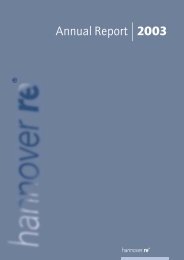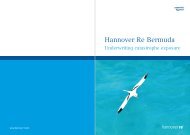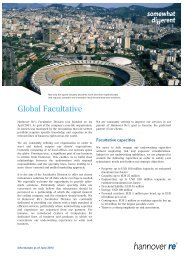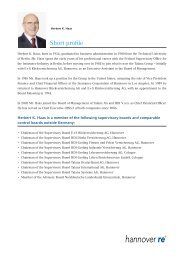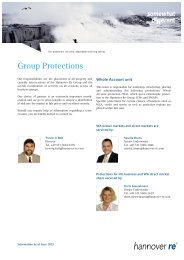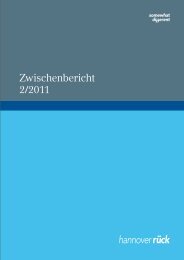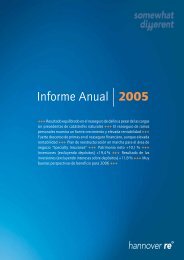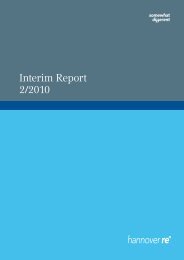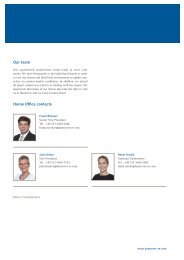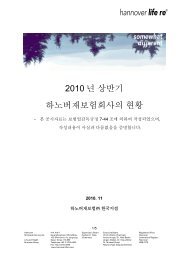Annual Report 2010 - Hannover Re
Annual Report 2010 - Hannover Re
Annual Report 2010 - Hannover Re
You also want an ePaper? Increase the reach of your titles
YUMPU automatically turns print PDFs into web optimized ePapers that Google loves.
Strategic risks derive from the risk of an imbalance between<br />
the corporate strategy and the constantly changing general<br />
business environment. Such an imbalance might be caused,<br />
for example, by incorrect strategic policy decisions or a failure<br />
to consistently implement the defined strategies. We therefore<br />
regularly review our corporate strategy and risk strategy and<br />
adjust our processes as and when required.<br />
A good corporate reputation is an indispensable prerequisite<br />
for our core business as a reinsurer. It often takes decades to<br />
build up a positive reputation, yet this reputation can be damaged<br />
or even destroyed within a very brief space of time. Management<br />
of this risk is made possible by our set communication<br />
channels, a professional approach to corporate<br />
communications, tried and tested processes for defined crisis<br />
scenarios as well as our established Code of Conduct.<br />
The liquidity risk refers to the risk of being unable to convert<br />
investments and other assets into cash in order to meet our<br />
financial obligations when they become due. The liquidity risk<br />
consists of the refinancing risk, i.e. the necessary cash cannot<br />
be obtained or can only be raised at increased costs, and the<br />
market liquidity risk, meaning that financial market transactions<br />
can only be completed at a poorer price than expected<br />
due to a lack of market liquidity. Our regular liquidity planning<br />
and the liquid asset structure of our investments are core elements<br />
of our ability to manage this risk. These mechanisms<br />
ensure that <strong>Hannover</strong> <strong>Re</strong> is able to meet its payment obligations<br />
at all times. We manage the liquidity risk inter alia by<br />
allocating a liquidity code to every security. Adherence to the<br />
limits defined in our investment guidelines for each liquidity<br />
class is subject to daily control. The spread of investments<br />
across the various liquidity classes is recorded in the monthly<br />
investment reports and managed/monitored by way of appropriate<br />
limits. Roughly half of our investment holdings under<br />
own management can be liquidated on any trading day without<br />
a mark-down, a reflection of the high liquidity of our portfolio.<br />
Assessment of the risk situation<br />
The above remarks describe the diverse spectrum of risks to<br />
which we, as an internationally operating reinsurance company,<br />
are exposed as well as the steps taken to manage and<br />
monitor them. The specified risks can potentially have a significant<br />
impact on our assets, financial position and net income.<br />
Yet consideration solely of the risk aspect does not fit<br />
our holistic conception of risk, since risks always go hand-inhand<br />
with opportunities. Our effective management and monitoring<br />
tools as well as our organisational and operational<br />
structures ensure that we are able to identify our risks in a<br />
timely manner and maximise our opportunities. For additional<br />
information on the opportunities and risks associated with<br />
our business please see the Forecast contained in the management<br />
report.<br />
The implementation of Solvency II effective 1 January 2013<br />
will, among other things, place more exacting regulatory demands<br />
on risk management. <strong>Hannover</strong> <strong>Re</strong> has long adopted a<br />
risk-based and value-based management approach of the type<br />
which regulators will then require. We began to make our<br />
preparations for the requirements of Solvency II at an early<br />
stage: this includes participation in all Quantitative Impact<br />
Studies (QIS) and entering the pre-application phase for approval<br />
of an internal capital model. We see Solvency II as an<br />
opportunity for the convergence of international regulatory<br />
and internal corporate approaches.<br />
Solvency II will also result in considerably increased compliance<br />
costs, principally in connection with extensive reporting<br />
and documentation requirements. Just how high these additional<br />
costs will be depends upon the interpretation of the<br />
Framework Directive by regulators.<br />
In the previous year we reported that, contrary to a very clear<br />
opinion expressed by tax attorneys, the revenue authority was<br />
of the view that not inconsiderable investment income generated<br />
by the <strong>Hannover</strong> <strong>Re</strong> Group’s reinsurance subsidiaries<br />
domiciled in Ireland was subject to taxation of foreign sourced<br />
income at the parent companies in Germany on the basis of<br />
the provisions of the Foreign Transactions Tax Act. Insofar as<br />
tax assessments to this effect had already been received, appeals<br />
were filed – also with respect to the amounts already<br />
recognised as a tax expense. After our opinion had been confirmed<br />
in full by the court of the first instance in 2009, we<br />
regarded as slight the risk that tax assessments containing<br />
taxation of foreign sourced investment income generated by<br />
Irish companies at the parent companies would be upheld.<br />
In October <strong>2010</strong> the Federal Fiscal Court (BFH) subsequently<br />
confirmed the lower-court decision. In the first quarter of 2011<br />
we received amended tax assessments from the revenue authority<br />
for some years; further amended tax assessments have<br />
been announced.<br />
Based on our currently available insights arrived at from a<br />
holistic analysis of the risk situation, the Executive Board of<br />
<strong>Hannover</strong> <strong>Re</strong> cannot at present discern any risks that could<br />
jeopardise the continued existence of our company in the<br />
short or medium term or have a material and lasting effect on<br />
our assets, financial position or net income.<br />
Management report<br />
<strong>Hannover</strong> <strong>Re</strong> Group annual report <strong>2010</strong><br />
opportunity and risk report Management report<br />
69



